
Jonathan Nicholas
@jonathannicholas.bsky.social
postdoc at nyu | (episodic) memory and decision making | jonathanicholas.github.io
Pinned

Episodic memory facilitates flexible decision making via access to detailed events
Our experiences contain countless details that may be important in the future, yet we rarely know which will matter and which won't. This uncertainty poses a difficult challenge for adaptive decision ...
www.biorxiv.org
Why do we remember so many details of our experiences even when it is unclear if we will actually ever need them?
In a new preprint, @marcelomattar.bsky.social and I asked whether this property is adaptive, because what will be relevant in the future often (usually?!) isn’t apparent.
In a new preprint, @marcelomattar.bsky.social and I asked whether this property is adaptive, because what will be relevant in the future often (usually?!) isn’t apparent.
Reposted by Jonathan Nicholas
When does new learning interfere with existing knowledge in people and ANNs? Great to have this out today in @nathumbehav.nature.com
Work with @summerfieldlab.bsky.social, @tsonj.bsky.social, Lukas Braun and Jan Grohn
www.nature.com/articles/s41...
Work with @summerfieldlab.bsky.social, @tsonj.bsky.social, Lukas Braun and Jan Grohn
www.nature.com/articles/s41...
October 31, 2025 at 2:47 PM
When does new learning interfere with existing knowledge in people and ANNs? Great to have this out today in @nathumbehav.nature.com
Work with @summerfieldlab.bsky.social, @tsonj.bsky.social, Lukas Braun and Jan Grohn
www.nature.com/articles/s41...
Work with @summerfieldlab.bsky.social, @tsonj.bsky.social, Lukas Braun and Jan Grohn
www.nature.com/articles/s41...
Reposted by Jonathan Nicholas
I'm recruiting PhD students for my lab at Northwestern! I'm reviewing applications for the Department of Psychology for the Cognitive Affective Neuroscience and Clinical areas, due 12/1. 🧠
Come join the CATS Lab: nucatslab.com
Learn about our latest research: iamh.northwestern.edu/research/res...
Come join the CATS Lab: nucatslab.com
Learn about our latest research: iamh.northwestern.edu/research/res...
CATS Lab
Child & Adolescent Translational Science Lab at Northwestern University
nucatslab.com
October 29, 2025 at 6:39 PM
I'm recruiting PhD students for my lab at Northwestern! I'm reviewing applications for the Department of Psychology for the Cognitive Affective Neuroscience and Clinical areas, due 12/1. 🧠
Come join the CATS Lab: nucatslab.com
Learn about our latest research: iamh.northwestern.edu/research/res...
Come join the CATS Lab: nucatslab.com
Learn about our latest research: iamh.northwestern.edu/research/res...
Reposted by Jonathan Nicholas
I’m excited to share my recent preprint on a neural network model of free recall that learns multiple memory strategies including the memory palace!
www.biorxiv.org/content/10.1...
www.biorxiv.org/content/10.1...
October 21, 2025 at 3:36 AM
I’m excited to share my recent preprint on a neural network model of free recall that learns multiple memory strategies including the memory palace!
www.biorxiv.org/content/10.1...
www.biorxiv.org/content/10.1...
Reposted by Jonathan Nicholas
New paper out in cognition with @arikahn.bsky.social, @nathanieldaw.bsky.social, Cate Hartley, and @katenuss.bsky.social !!
We show that children 👶 use predictive representations (e.g. SR) to guide their choices, providing an account of how they can make flexible choices in a changing world
We show that children 👶 use predictive representations (e.g. SR) to guide their choices, providing an account of how they can make flexible choices in a changing world
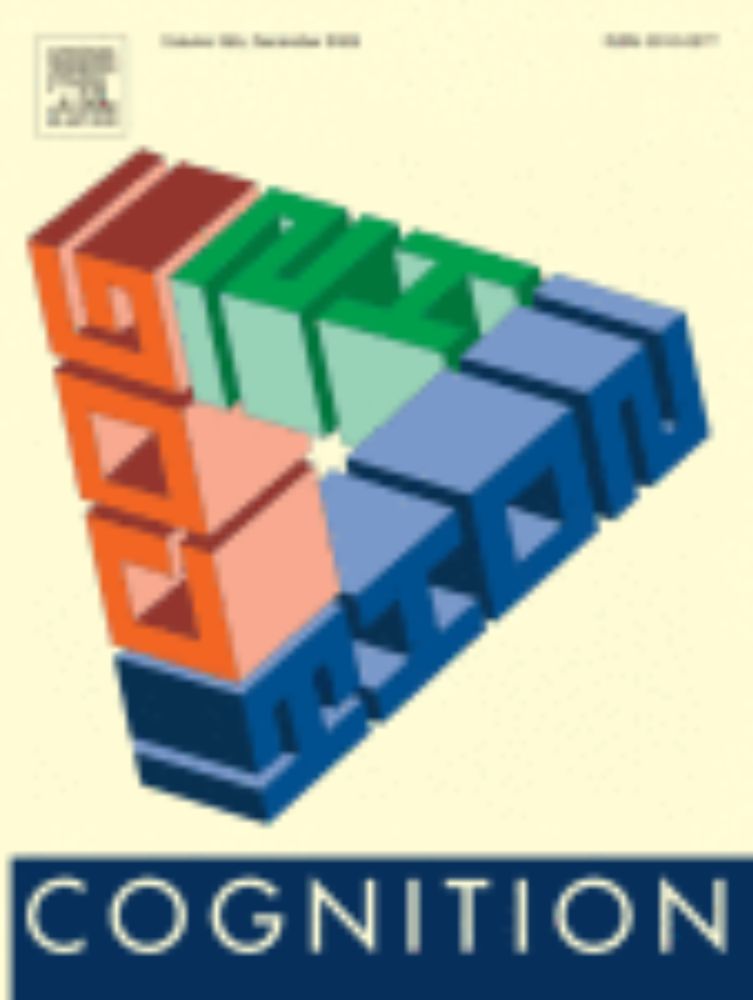
Children leverage predictive representations for flexible, value-guided choice
By harnessing a mental model of how the world works, learners can make flexible choices in changing environments. However, while children and adolesce…
www.sciencedirect.com
October 15, 2025 at 10:52 AM
New paper out in cognition with @arikahn.bsky.social, @nathanieldaw.bsky.social, Cate Hartley, and @katenuss.bsky.social !!
We show that children 👶 use predictive representations (e.g. SR) to guide their choices, providing an account of how they can make flexible choices in a changing world
We show that children 👶 use predictive representations (e.g. SR) to guide their choices, providing an account of how they can make flexible choices in a changing world
Reposted by Jonathan Nicholas
Why does AI sometimes fail to generalize, and what might help? In a new paper (arxiv.org/abs/2509.16189), we highlight the latent learning gap — which unifies findings from language modeling to agent navigation — and suggest that episodic memory complements parametric learning to bridge it. Thread:

Latent learning: episodic memory complements parametric learning by enabling flexible reuse of experiences
When do machine learning systems fail to generalize, and what mechanisms could improve their generalization? Here, we draw inspiration from cognitive science to argue that one weakness of machine lear...
arxiv.org
September 22, 2025 at 4:21 AM
Why does AI sometimes fail to generalize, and what might help? In a new paper (arxiv.org/abs/2509.16189), we highlight the latent learning gap — which unifies findings from language modeling to agent navigation — and suggest that episodic memory complements parametric learning to bridge it. Thread:
Reposted by Jonathan Nicholas
I’m super excited to finally put my recent work with @behrenstimb.bsky.social on bioRxiv, where we develop a new mechanistic theory of how PFC structures adaptive behaviour using attractor dynamics in space and time!
www.biorxiv.org/content/10.1...
www.biorxiv.org/content/10.1...
September 24, 2025 at 12:04 PM
I’m super excited to finally put my recent work with @behrenstimb.bsky.social on bioRxiv, where we develop a new mechanistic theory of how PFC structures adaptive behaviour using attractor dynamics in space and time!
www.biorxiv.org/content/10.1...
www.biorxiv.org/content/10.1...
Reposted by Jonathan Nicholas
New preprint from the lab! 🧠
Led by Juliana Trach, w/ Sophia Ou
Using fMRI, we discovered evidence for time-sensitive reward prediction errors (RPEs) in the human cerebellum.
Builds on, and extends, recent work in both rodents and NHPs
Led by Juliana Trach, w/ Sophia Ou
Using fMRI, we discovered evidence for time-sensitive reward prediction errors (RPEs) in the human cerebellum.
Builds on, and extends, recent work in both rodents and NHPs
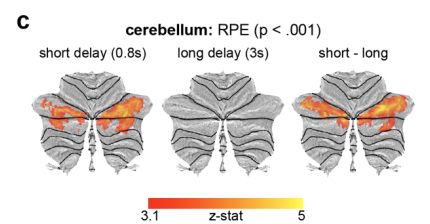
September 8, 2025 at 2:31 PM
New preprint from the lab! 🧠
Led by Juliana Trach, w/ Sophia Ou
Using fMRI, we discovered evidence for time-sensitive reward prediction errors (RPEs) in the human cerebellum.
Builds on, and extends, recent work in both rodents and NHPs
Led by Juliana Trach, w/ Sophia Ou
Using fMRI, we discovered evidence for time-sensitive reward prediction errors (RPEs) in the human cerebellum.
Builds on, and extends, recent work in both rodents and NHPs
Reposted by Jonathan Nicholas
I'm excited to share that my new postdoctoral position is going so well that I submitted a new paper at the end of my first week! www.biorxiv.org/content/10.1... A thread below

Sensory Compression as a Unifying Principle for Action Chunking and Time Coding in the Brain
The brain seamlessly transforms sensory information into precisely-timed movements, enabling us to type familiar words, play musical instruments, or perform complex motor routines with millisecond pre...
www.biorxiv.org
September 6, 2025 at 2:36 PM
I'm excited to share that my new postdoctoral position is going so well that I submitted a new paper at the end of my first week! www.biorxiv.org/content/10.1... A thread below
Reposted by Jonathan Nicholas
Successful prediction of the future enhances encoding of the present.
I am so delighted that this work found a wonderful home at Open Mind. The peer review journey was a rollercoaster but it *greatly* improved the paper.
direct.mit.edu/opmi/article...
I am so delighted that this work found a wonderful home at Open Mind. The peer review journey was a rollercoaster but it *greatly* improved the paper.
direct.mit.edu/opmi/article...
August 9, 2025 at 4:27 PM
Successful prediction of the future enhances encoding of the present.
I am so delighted that this work found a wonderful home at Open Mind. The peer review journey was a rollercoaster but it *greatly* improved the paper.
direct.mit.edu/opmi/article...
I am so delighted that this work found a wonderful home at Open Mind. The peer review journey was a rollercoaster but it *greatly* improved the paper.
direct.mit.edu/opmi/article...
Reposted by Jonathan Nicholas
Thrilled to announce that I'll be starting in January 2026 as an Assistant Professor of Psychology at Hunter College, City University of New York.
The lab will study the thought processes that underlie our decision-making.
The lab will study the thought processes that underlie our decision-making.

August 6, 2025 at 4:35 PM
Thrilled to announce that I'll be starting in January 2026 as an Assistant Professor of Psychology at Hunter College, City University of New York.
The lab will study the thought processes that underlie our decision-making.
The lab will study the thought processes that underlie our decision-making.
Reposted by Jonathan Nicholas
Very happy to see this work with Euan Prentis posted! If you’re going to CCN next week, go check out Euan’s poster on this work!
Overcoming distortion in multidimensional predictive representation https://www.biorxiv.org/content/10.1101/2025.07.29.667463v1
July 31, 2025 at 9:03 PM
Very happy to see this work with Euan Prentis posted! If you’re going to CCN next week, go check out Euan’s poster on this work!
Reposted by Jonathan Nicholas
My first, first author paper, comparing the properties of memory-augmented large language models and human episodic memory, out in @cp-trendscognsci.bsky.social!
authors.elsevier.com/a/1lV174sIRv...
Here’s a quick 🧵(1/n)
authors.elsevier.com/a/1lV174sIRv...
Here’s a quick 🧵(1/n)
authors.elsevier.com
July 26, 2025 at 3:05 PM
My first, first author paper, comparing the properties of memory-augmented large language models and human episodic memory, out in @cp-trendscognsci.bsky.social!
authors.elsevier.com/a/1lV174sIRv...
Here’s a quick 🧵(1/n)
authors.elsevier.com/a/1lV174sIRv...
Here’s a quick 🧵(1/n)
Reposted by Jonathan Nicholas
Super excited to share this one!! Meta-learning sparsity and learning rate gives rise to brain-like gradients of complementary learning systems. So complementary learning systems emerge organically through behavior optimization, and it's not just two of them!!
Excited to share a new preprint w/ @annaschapiro.bsky.social! Why are there gradients of plasticity and sparsity along the neocortex–hippocampus hierarchy? We show that brain-like organization of these properties emerges in ANNs that meta-learn layer-wise plasticity and sparsity. bit.ly/4kB1yg5
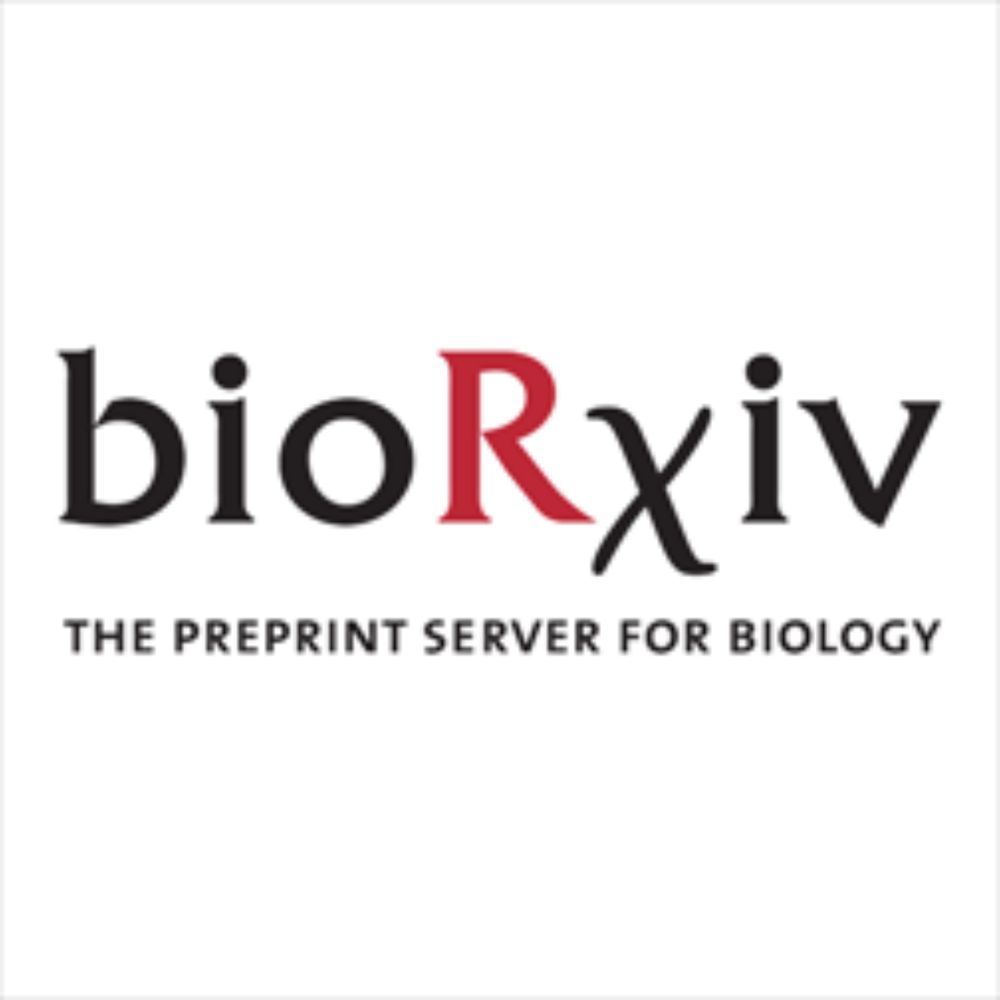
A gradient of complementary learning systems emerges through meta-learning
Long-term learning and memory in the primate brain rely on a series of hierarchically organized subsystems extending from early sensory neocortical areas to the hippocampus. The components differ in t...
bit.ly
July 16, 2025 at 4:18 PM
Super excited to share this one!! Meta-learning sparsity and learning rate gives rise to brain-like gradients of complementary learning systems. So complementary learning systems emerge organically through behavior optimization, and it's not just two of them!!
Reposted by Jonathan Nicholas
Thrilled to see our TinyRNN paper in @nature! We show how tiny RNNs predict choices of individual subjects accurately while staying fully interpretable. This approach can transform how we model cognitive processes in both healthy and disordered decisions. doi.org/10.1038/s415...
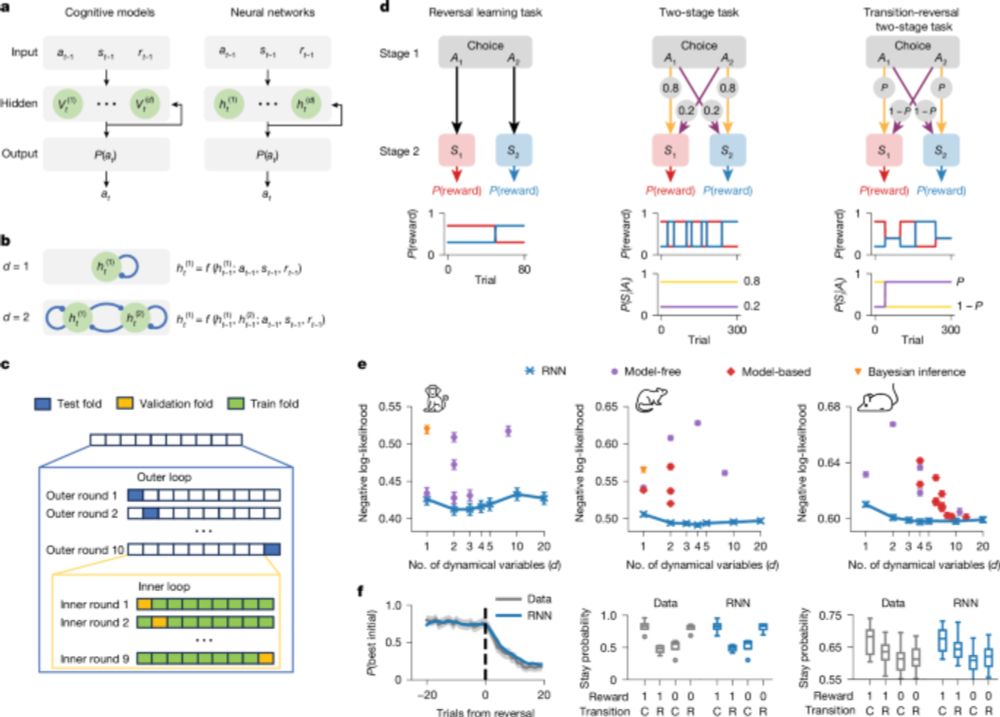
Discovering cognitive strategies with tiny recurrent neural networks - Nature
Modelling biological decision-making with tiny recurrent neural networks enables more accurate predictions of animal choices than classical cognitive models and offers insights into the underlying cog...
doi.org
July 2, 2025 at 7:03 PM
Thrilled to see our TinyRNN paper in @nature! We show how tiny RNNs predict choices of individual subjects accurately while staying fully interpretable. This approach can transform how we model cognitive processes in both healthy and disordered decisions. doi.org/10.1038/s415...
Reposted by Jonathan Nicholas
One way to tackle a new task is to reuse solutions from the past. Check out Sam Hall-McMaster's latest finding that strategy reuse is accompanied by neural reactivation of prior solutions @plosbiology.org
Collab w/ M Tomov & @gershbrain.bsky.social
#neuroskyence
journals.plos.org/plosbiology/...
Collab w/ M Tomov & @gershbrain.bsky.social
#neuroskyence
journals.plos.org/plosbiology/...
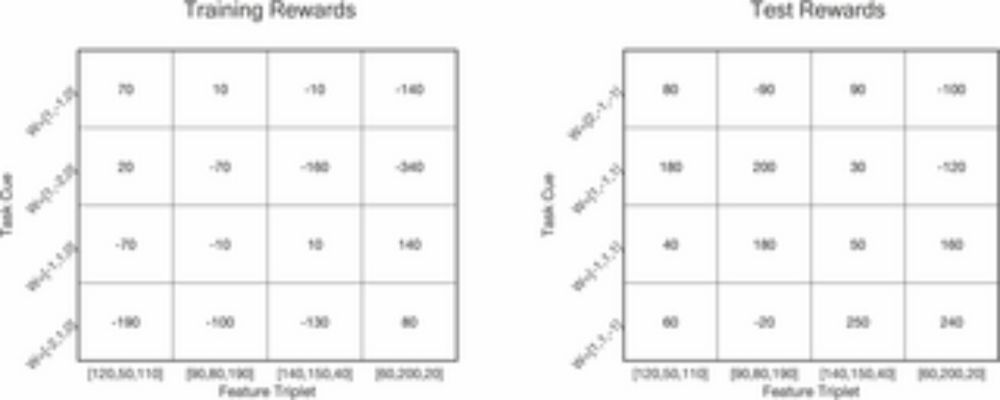
Neural evidence that humans reuse strategies to solve new tasks
Humans can apply solutions used in past problems to new problems. In this study, the authors reveal the neural correlates of this process, known as generalization, and show that humans apply past poli...
journals.plos.org
June 6, 2025 at 2:39 PM
One way to tackle a new task is to reuse solutions from the past. Check out Sam Hall-McMaster's latest finding that strategy reuse is accompanied by neural reactivation of prior solutions @plosbiology.org
Collab w/ M Tomov & @gershbrain.bsky.social
#neuroskyence
journals.plos.org/plosbiology/...
Collab w/ M Tomov & @gershbrain.bsky.social
#neuroskyence
journals.plos.org/plosbiology/...
Reposted by Jonathan Nicholas
📢 now out @natrevpsychol.nature.com In a new perspective w/ @davidnagy.bsky.social & @gergoorban.bsky.social, we reconcile a glaring problem in applying rate-distortion theory as a framework for human memory, integrating empirical findings across a host of human memory research 🧵👇
Adaptive compression as a unifying framework for episodic and semantic memory
Perspective by David G. Nagy (@davidnagy.bsky.social), Gergő Orbán & Charley M. Wu (@thecharleywu.bsky.social)
Web: go.nature.com/3ZkmRLb
PDF: rdcu.be/epAQ0
Perspective by David G. Nagy (@davidnagy.bsky.social), Gergő Orbán & Charley M. Wu (@thecharleywu.bsky.social)
Web: go.nature.com/3ZkmRLb
PDF: rdcu.be/epAQ0

June 6, 2025 at 8:11 AM
📢 now out @natrevpsychol.nature.com In a new perspective w/ @davidnagy.bsky.social & @gergoorban.bsky.social, we reconcile a glaring problem in applying rate-distortion theory as a framework for human memory, integrating empirical findings across a host of human memory research 🧵👇
Reposted by Jonathan Nicholas
I’m thrilled to announce that I will start as a presidential assistant professor in Neuroscience at the City U of Hong Kong in Jan 2026!
I have RA, PhD, and postdoc positions available! Come work with me on neural network models + experiments on human memory!
RT appreciated!
(1/5)
I have RA, PhD, and postdoc positions available! Come work with me on neural network models + experiments on human memory!
RT appreciated!
(1/5)
May 8, 2025 at 1:16 AM
I’m thrilled to announce that I will start as a presidential assistant professor in Neuroscience at the City U of Hong Kong in Jan 2026!
I have RA, PhD, and postdoc positions available! Come work with me on neural network models + experiments on human memory!
RT appreciated!
(1/5)
I have RA, PhD, and postdoc positions available! Come work with me on neural network models + experiments on human memory!
RT appreciated!
(1/5)
work with fred! can’t recommend more highly
Despite the world being on fire, I can't help but be thrilled to announce that I'll be starting as an Assistant Professor in the Cognitive Science Program at Dartmouth in Fall '26. I'll be recruiting grad students this upcoming cycle—get in touch if you're interested!
May 7, 2025 at 11:15 PM
work with fred! can’t recommend more highly
Reposted by Jonathan Nicholas
🚨Today's Computational Psychiatry seminar at the MPC is given by Dr. Jonathan Nicholas @jonathannicholas.bsky.social
Episodic memory facilitates flexible decision making via access to individual events and their details.
2pm London UK time. DM @yanivabir.bsky.social to join.
Episodic memory facilitates flexible decision making via access to individual events and their details.
2pm London UK time. DM @yanivabir.bsky.social to join.
April 24, 2025 at 10:35 AM
🚨Today's Computational Psychiatry seminar at the MPC is given by Dr. Jonathan Nicholas @jonathannicholas.bsky.social
Episodic memory facilitates flexible decision making via access to individual events and their details.
2pm London UK time. DM @yanivabir.bsky.social to join.
Episodic memory facilitates flexible decision making via access to individual events and their details.
2pm London UK time. DM @yanivabir.bsky.social to join.
Reposted by Jonathan Nicholas
Come see our lab's first poster at #SANS2025!!
Megan Spurney will present exciting new results revealing that rewards boost working memory accuracy for kids and teens, but less so for adults.
Friday 4/25 @ 4:15
Poster P2-A-13
Investigating Age-Related Flexibility in Cognitive Effort Allocation
Megan Spurney will present exciting new results revealing that rewards boost working memory accuracy for kids and teens, but less so for adults.
Friday 4/25 @ 4:15
Poster P2-A-13
Investigating Age-Related Flexibility in Cognitive Effort Allocation
April 23, 2025 at 11:20 PM
Come see our lab's first poster at #SANS2025!!
Megan Spurney will present exciting new results revealing that rewards boost working memory accuracy for kids and teens, but less so for adults.
Friday 4/25 @ 4:15
Poster P2-A-13
Investigating Age-Related Flexibility in Cognitive Effort Allocation
Megan Spurney will present exciting new results revealing that rewards boost working memory accuracy for kids and teens, but less so for adults.
Friday 4/25 @ 4:15
Poster P2-A-13
Investigating Age-Related Flexibility in Cognitive Effort Allocation
Reposted by Jonathan Nicholas
The precision of hippocampal representations predicts incremental value-learning across the adult lifespan https://www.biorxiv.org/content/10.1101/2025.04.08.647815v1
April 9, 2025 at 8:15 AM
The precision of hippocampal representations predicts incremental value-learning across the adult lifespan https://www.biorxiv.org/content/10.1101/2025.04.08.647815v1
Reposted by Jonathan Nicholas
See me at #COSYNE2025 poster session 2 if you want to learn more about this emerging work!
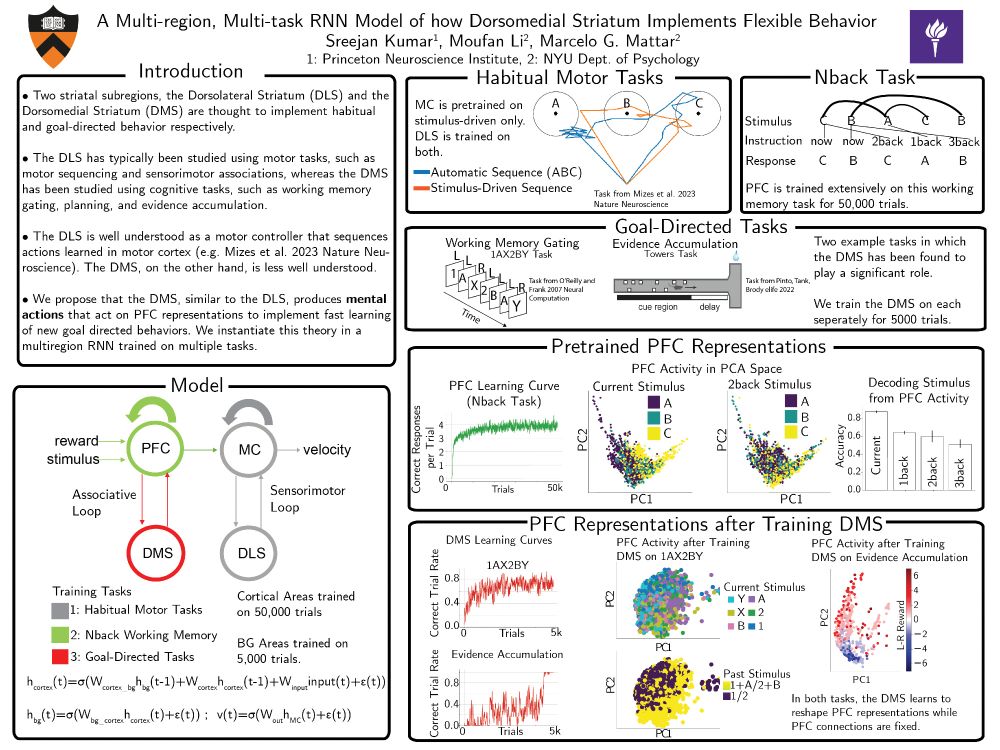
March 26, 2025 at 7:30 PM
See me at #COSYNE2025 poster session 2 if you want to learn more about this emerging work!
Why do we remember so many details of our experiences even when it is unclear if we will actually ever need them?
In a new preprint, @marcelomattar.bsky.social and I asked whether this property is adaptive, because what will be relevant in the future often (usually?!) isn’t apparent.
In a new preprint, @marcelomattar.bsky.social and I asked whether this property is adaptive, because what will be relevant in the future often (usually?!) isn’t apparent.

Episodic memory facilitates flexible decision making via access to detailed events
Our experiences contain countless details that may be important in the future, yet we rarely know which will matter and which won't. This uncertainty poses a difficult challenge for adaptive decision ...
www.biorxiv.org
March 14, 2025 at 4:00 PM
Why do we remember so many details of our experiences even when it is unclear if we will actually ever need them?
In a new preprint, @marcelomattar.bsky.social and I asked whether this property is adaptive, because what will be relevant in the future often (usually?!) isn’t apparent.
In a new preprint, @marcelomattar.bsky.social and I asked whether this property is adaptive, because what will be relevant in the future often (usually?!) isn’t apparent.
Reposted by Jonathan Nicholas
Thank you to Ingrid Wickelgren and the team at Quanta for putting together this great piece, describing work by my lab and others on the neural representations of events
New neuroscience research is en route to unlocking a universal human code for recording experiences as memory. What’s their secret weapon? Airport scenes in movies.
www.quantamagazine.org/how-event-sc...
www.quantamagazine.org/how-event-sc...

How ‘Event Scripts’ Structure Our Personal Memories | Quanta Magazine
By screening films in a brain scanner, neuroscientists discovered a rich library of neural scripts — from a trip through an airport to a marriage proposal — that form scaffolds for memories of our exp...
www.quantamagazine.org
February 22, 2025 at 12:53 PM
Thank you to Ingrid Wickelgren and the team at Quanta for putting together this great piece, describing work by my lab and others on the neural representations of events
Excited to share a new paper with Daphna Shohamy & @nathanieldaw.bsky.social! Using fmri reactivation, we measured *when* people build preferences from memory. We found that people tend to do so before a choice, but that they also wait until choice time when options are linked to multiple memories
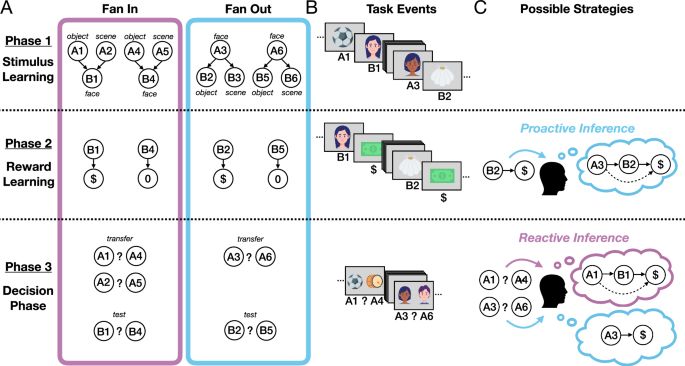
Proactive and reactive construction of memory-based preferences - Nature Communications
Making new decisions requires retrieving memories, but when this occurs is unclear. The authors show that people typically access memories before a choice unless there are many related memories to con...
www.nature.com
February 14, 2025 at 4:04 PM
Excited to share a new paper with Daphna Shohamy & @nathanieldaw.bsky.social! Using fmri reactivation, we measured *when* people build preferences from memory. We found that people tend to do so before a choice, but that they also wait until choice time when options are linked to multiple memories

